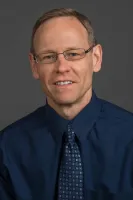Industries interested in collaborating with UW-Eau Claire will have access to faculty expertise and student researchers, says Dr. Doug Dunham, interim director of strategic partnerships and program development who manages the OCCP.
“I’ve always been very passionate about trying to connect the university with industry and other organizations,” Dunham says. “We have both the expertise and the instrumentation. In some cases, industries need analysis done and they don’t have the ability to do it. We have both the equipment and the expertise to help with that.
“When you start to see the university as a whole there are so many really smart people here who can help solve all kinds of issues, but we have to know what those issues are.”
On Oct. 18, the OCCP will host the conference “University Partnerships: Unlocking Potential” for local and regional businesses to learn how they can collaborate on projects with UW-Eau Claire. The event will be from 9 a.m.-1 p.m. in the Council Oak Room of Davies Center.
A higher education institution the size of UW-Eau Claire may be in a better position to assist industries than top-tier urban research universities whose faculty are primarily focused on publishing faculty research and obtaining research grants, Dunham says.
“At UW-Eau Claire, we’re more tied to the community,” Dunham says. “The faculty have the expertise and if an opportunity comes, we can be more flexible than bigger schools can be. Certainly, we can be more responsive and I think more willing to listen, especially for small companies.”
Academic departments and the UW-Eau Claire Foundation already collaborate with more than 350 businesses, organizations and government agencies. The new office will keep an inventory of those joint efforts and look for opportunities to expand the collaborations into strategic partnerships, Dunham says.
“The goal isn’t to just have a partnership, but to have an ongoing partnership, establish something that is long term,” Dunham says. “As the company’s needs or the community agency’s needs change, we can change with that. As the needs change, we can still satisfy those needs.”






